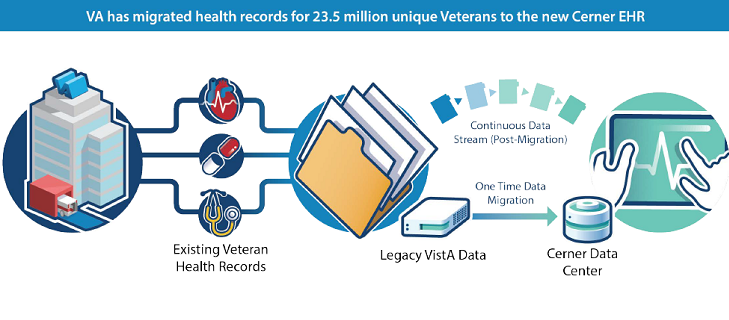WASHINGTON, DC — VA has called a halt to all future deployments of its new electronic health record (EHR) system in order to prioritize fixing issues at the five sites where the system is already deployed. The halt, announced at the end of April, is part of what the department is calling “a larger program reset.”
Since going live, the system has been plagued with multiple issues impacting basic hospital functions, including some that have since been shown to have contributed to patient harm.
As soon as the Cerner-designed system was deployed at the Mann-Grandstaff VAMC in Spokane, WA, in October 2020, staff began encountering issues. Functions that had been simple under the legacy VISTA system required complex, time-consuming workarounds. Poor or hurried training left staff unsure of how many aspects of the system worked. One of those resulted in the redirecting of physician orders into an inaccessible online file where they went unseen and unfilled. The VA Office of the Inspector General (OIG) eventually found that the rerouting of orders resulted in 150 adverse patient events.
The extent of the challenges would take OIG and other watchdogs two years and multiple reports to fully document, however. Meanwhile, VA continued with its rollout. After pandemic-related delays and making what it thought were substantive fixes to the system, it launched the EHR at Walla-Walla, WA, in March 2022, in Columbus, OH, in April 2022, and in Roseburg and White City, OR, in June 2022.
As the extent of patient harm began to be known and some of these other sites began facing problems first encountered in Spokane, VA called a pause to the rollout in July 2022 that would eventually be extended to July 2023.
Throughout the last year, VA has worked with Oracle, which purchased Cerner in June 2022, to address the long list of EHR problems identified by OIG and Congress, with department leaders regularly appearing before Congress to give progress reports.
As July 2023 grew closer, the discussion around whether the rollout was ready to continue reached a fever pitch. VA officials assured Congress they were making progress, while agency watchdogs told legislators that the department did not have the metrics to determine what “progress” really looked like. In February, Republican lawmakers introduced legislation that would end VA’s EHR Modernization Program entirely, shifting the five sites using the new system back to the legacy VISTA architecture.
And last month, Democrats introduced an alternative bill–the EHR Program RESET Act–which would restructure the entire EHRM program while mandating aggressive reporting to Congress. It also includes provisions requiring VA to aggressively negotiate new contract terms with Oracle–something the department is currently in the process of.
With this temporary halt, VA has appeased all sides, at least for the time being. According to the department, additional deployments will not be scheduled until VA is confident the new EHR is “highly functional” at current sites.
“This readiness will be demonstrated by clear improvements to the clinician and veteran experience; sustained high performance and high reliability of the system; improved levels of productivity at the sites where the EHR is in use; and more,” VA stated in a press release. “When these criteria are met and the reset period concludes, VA will release a new deployment schedule and re-start deployments.”
“For the past few years, we’ve tried to fix this plane while flying it—and that hasn’t delivered the results that veterans or our staff deserve,” added Neil Evans, MD, acting director of the EHRM Integration Office. “This reset changes that. We are going to take the time necessary to get this right.”
In the meantime, VA will continue to renegotiate its contract with Oracle. The original $10 billion contract has been heavily criticized almost from the moment it was signed in 2018.
Rather than place the contract out for an open bid, VA chose not to, going with the Cerner system because a variation of that software was being rolled-out at DoD healthcare facilities. Since then, VA watchdogs have found that the department missed an opportunity to analyze the full scope of its healthcare system’s needs and examine the full scope of off-the-shelf software solutions on the market.
The contract has also been criticized for being soft on the developer in the event of system delays or errors. Both VA and legislators are looking for any new contract to include harsher penalties for any future problems that can be laid at the feet of Oracle. The deadline to renew the contract is May 16.


